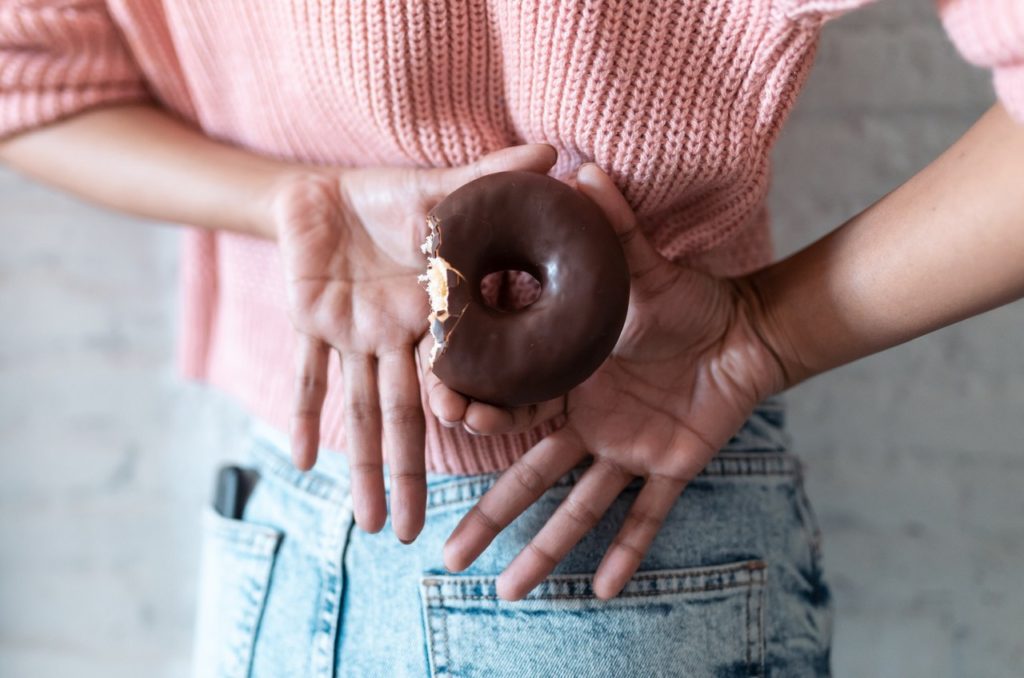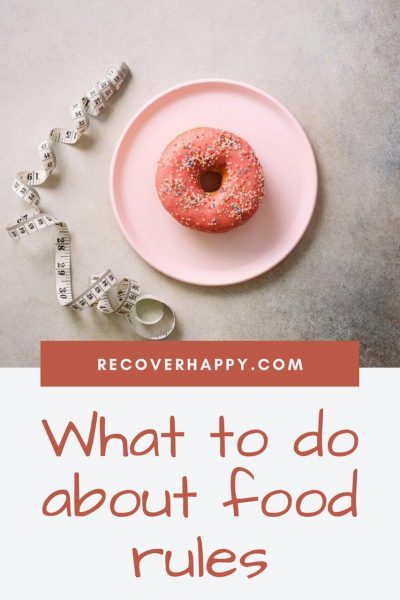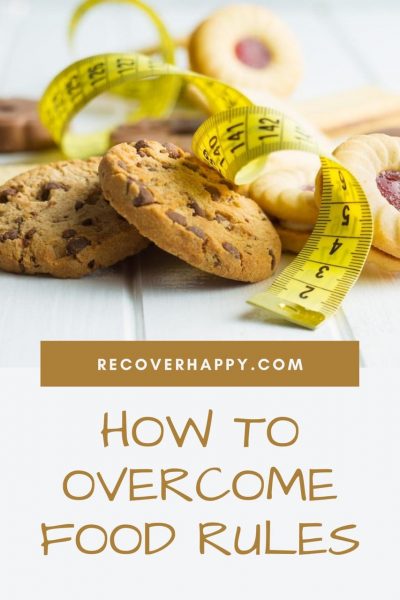Food rules - How to disobey them
By Tanja, Psychologist for Eating Disorders & Body Image

If you have an eating disorder or diet regularly you might have developed food rules that you try to follow.

Hi there!
I’m Tanja. I’m a qualified psychologist specialising in eating disorders, negative body image and body hate. I’m also a survivor of anorexia.
My mission is to help you to end your lifelong struggles with food and your body and inspire you to uncover and embrace you true worth. Read more…
Even if you haven’t told anyone about these food rules, written them down or even considered them to be rules, it is very likely that you have certain beliefs about what you must do or mustn’t do with food. The food rules might be about what, how much and when you can eat; or even the way you are allowed to eat.
I remember that some of my many food rules instructed me to: eat only one small square of milk chocolate per day after 8 pm (but only if the scale showed a certain weight); eat bread without butter; or eat ice cream only if I skipped dinner or lunch.
You might have developed these food rules consciously or not, but a crucial part of eating disorder recovery and healing your body image issues is becoming aware of your food rules so that you can challenge them, let them go and build a more satisfying relationship with food.
Why do we make food rules?
The reason you have created certain food rules is to stay in line and feel safe while eating and being dealing with food, especially if you are tempted or anxious around food. The food rules can give you a feeling of control and assurance that nothing unexpected or bad will happen. You might also use them because they reduce the distrust you feel towards your appetite, desires and decisions. If you think you can’t trust your body or yourself, it is quite clever to develop rules that keep you in line.
Join the Body Acceptance & Food Freedom Collective
Receive a weekly dose of inspirations to help you make peace with your body and food.
Don’t worry, we hate spam too. You can unsubscribe any time.
Categories
Anorexia
Binge Eating Disorder
Bulimia
Intuitive Eating
Mindfulness
Orthorexia
Strategies for Recovery
How do you know if you have food rules?
A sign that you have one or more food rules is when you feel guilt or anxious after eating. If there were no rule, you wouldn’t feel guilty or anxious, right?
Another sign of food rules is whether they apply to anyone else or only to you. For instance, if you think that everyone else can eat at any time, but you are allowed only to eat at certain times.
Here are some examples of what food rules could look like:
– Only clean or organic food.
– No carbs or starches.
– Not more than x calories a day.
– Only eat after a workout session
– Only one treat per day.
– No big plates or glasses.
– Dinner must be before x pm.
– The food portion must be less than everyone else’s portion.
To become aware of your food rules, monitor your decision-making process for a day. If you are hungry or want to eat something, observe if you have any restrictions on what you are allowed to eat. An intuitive eater or healthy eater would notice that they were hungry and think about what to eat and finally eat it without feeling guilty, ashamed or anxious.
If you want to know more about how you can use intuitive eating in your eating disorder recovery journey read my blog articles The power of intuitive eating in eating disorder recovery and The 10 principles of intuitive eating in eating disorder recovery.

The problem with food rules
Rules are made to be broken, which usually has negative emotional consequences, such as anger about oneself, feelings of fear and guilt, negative thoughts about one’s self-worth or even the feeling of being a failure. Breaking food rules can also cause negative thoughts like “I feel fat”, “I’m ugly” or “I’m out of control”. Experiencing these emotions and thoughts is unpleasant enough, but this can also make you more vulnerable to binge eating behaviours.
Another problem associated with food rules is the “all-or-nothing”, or “black- and-white” thinking. This means that something can be only one of two things: right or wrong or good or bad. For instance, the food rule to avoid eating any carbs doesn’t allow you to eat any carbs in any form. Therefore, when you eat a slice of bread, the all-or-nothing thinking begins. Even though nothing bad will actually happen to you from eating a slice of bread, your mind will probably go wild and you will feel you have completely broken your rules. Once you feel this way, you might have thoughts like,”I’ve broken the rule, so I might as well just keep eating, as it doesn’t matter anymore.” This can also lead to binge eating.
If you want to know more about the reason of binge eating, read my article What is the real reason behind your binge eating.

How to disobey your food rules
Follow these steps below to identify, evaluate and reconsider your food rules.
1. Note down the food rules you follow or think you should follow.
By doing this, think about as many reasons as possible for each rule, what you think it does for you and what your beliefs are.
2. Evaluate your rules by asking yourself the following questions for each rule
- How did I come up with this rule?
- What happens if I break the rule?
- Is the rule based on facts or fears?
- How does this rule interfere with my relationships?
- Do other people have to follow this rule?
- Can I be flexible with this rule?
- What do I gain by following this rule?
- What do I give up by not following this rule?
- What would it take for me to give up this rule?
3. Challenge your food rules
To work towards getting well, you will need to challenge your food rules. Start by picking two of the rules you are willing to work on and note them down. Then write down how you will challenge these rules and who might be able to help you make this change.
When you start, you might experience some resistance to change, but when you start to break your rules, even just a tiny bit, the rules will loosen and eating will become easier. Expect to feel uncomfortable and scared at first, but the feelings will pass and you will be ok. Be sure not to create new rules while you are working on letting go of your other food rules.
You don’t need to struggle alone on your recovery journey.
Simply get in touch to discuss how I can help you.
It is entirely possible to overcome an eating disorder or body hate –
I have done it, others have done it and so can you!
Join the Body Acceptance & Food Freedom Collective
Receive a weekly dose of inspirations to help you make peace with your body and food.
Don’t worry, we hate spam too. You can unsubscribe any time.
You Might Also Enjoy...

Hi there!
I’m Tanja. I’m a qualified psychologist specialising in eating disorders, negative body image and body hate. I’m also a survivor of anorexia.
My mission is to help you to end your lifelong struggles with food and your body and inspire you to uncover and embrace you true worth. Read more…



